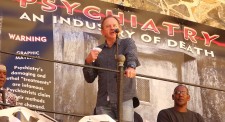
Hitler adopted the theories espoused by a German psychiatrist in South West Africa to justify his racist policies.
Cape Town, South Africa, December 1, 2016 (Newswire.com) - Dr. Koos Marais, keynote speaker at the opening of a human rights exhibit in Cape Town this week, addressed the role psychiatry played in the Holocaust and apartheid.
The exhibit, Psychiatry: An Industry of Death, is produced and organized by Citizens Commission on Human Rights (CCHR). It brings the harsh realities of psychiatric abuse to tens of thousands each year using historical photographs and film to expose the industry’s crimes including psychiatry’s fueling of eugenics and racism.
In his book Africa Die Keiservoel oor Namaland (Kaiser Bird Over Namaland [the region in South West Africa to which the country’s non-whites were forcibly moved]), Dr. Marais reveals a grim and little-known chapter in the history of Nazi eugenics.
While imprisoned in Landsberg in 1924, Hitler read Principles of Human Heredity and Race Hygiene, a textbook by German psychiatrist Eugen Fischer. Hitler incorporated Fischer’s eugenics theories in his manifesto, Mein Kampf.
Marais reveals in his book that early in his career, Fischer experimented on native (Khoisan) people held in concentration camps on Shark Island in the German colony of South West Africa, now known as Namibia. As part of his macabre “research,” Fischer decapitated indigenous victims and sent their skulls to Germany so psychiatrists could study so-called “inferior races.”
Fischer claimed mixed-race children were inferior to their German fathers and should be prohibited. His recommendations were adopted in 1912 when interracial marriage was outlawed throughout African German colonies. These same psychiatric theories provided the justification to the government of South Africa to establish and maintain apartheid.
Whereas German psychiatrists have confessed their role in the Holocaust, South African psychiatrists have never admitted their part in apartheid and its horrific human consequences.
“I wrote my book about these events in order to hold up a mirror to society, to show the world how a small, seemingly unimportant chain of events can have serious consequences,” said Marais.
Shortly after apartheid fell in 1997, CCHR presented an extensive submission to the Truth and Reconciliation Commission (TRC) documenting the crimes of psychiatry and psychology against non-white South Africans, including psychiatry’s eugenics “studies” that fueled the country’s racism.
The TRC submission detailed how South African psychiatrists incarcerated 10,000 blacks in secret psychiatric camps in the 1970s, where they drugged them and subjected them to electroshock without anesthetic as punishment. Blacks held in these camps, funded by the apartheid government, were allowed to die from easily treatable medical conditions. Those who lived were used for slave labor.
When CCHR first exposed these crimes in 1975, psychiatrists pressed the apartheid government to make it a criminal offense to report or photograph conditions in psychiatric hospitals. CCHR then went to the World Health Organization, which investigated the camps and in 1983 reported, “In no other medical field in South Africa is the contempt of the person, cultivated by racism, more concisely portrayed than in psychiatry.”
In 1999, the late Lawrence Anthony, an advisor to CCHR International, represented the South African Department of Health in his presentation to a World Psychiatric Association (WPA) meeting where he said that psychiatrists in South Africa had “failed to admit any guilt or responsibility” in apartheid. “Unfortunately, the fact remains that without the driving forces of psychiatry and psychology, both the Holocaust and apartheid arguably may not have happened or, at the very least, wouldn’t have been maintained,” he said.
CCHR was established in 1969 by the Church of Scientology and professor of psychiatry Thomas Szasz, a vocal critic and reformer of psychiatry. It has been instrumental in enacting more than 180 laws worldwide to protect individuals from coercive psychiatric practices, including a federal U.S. law that prohibits schools from forcing children to take psychiatric drugs as a requisite for their education.
Source: Church of Scientology International
Share:
